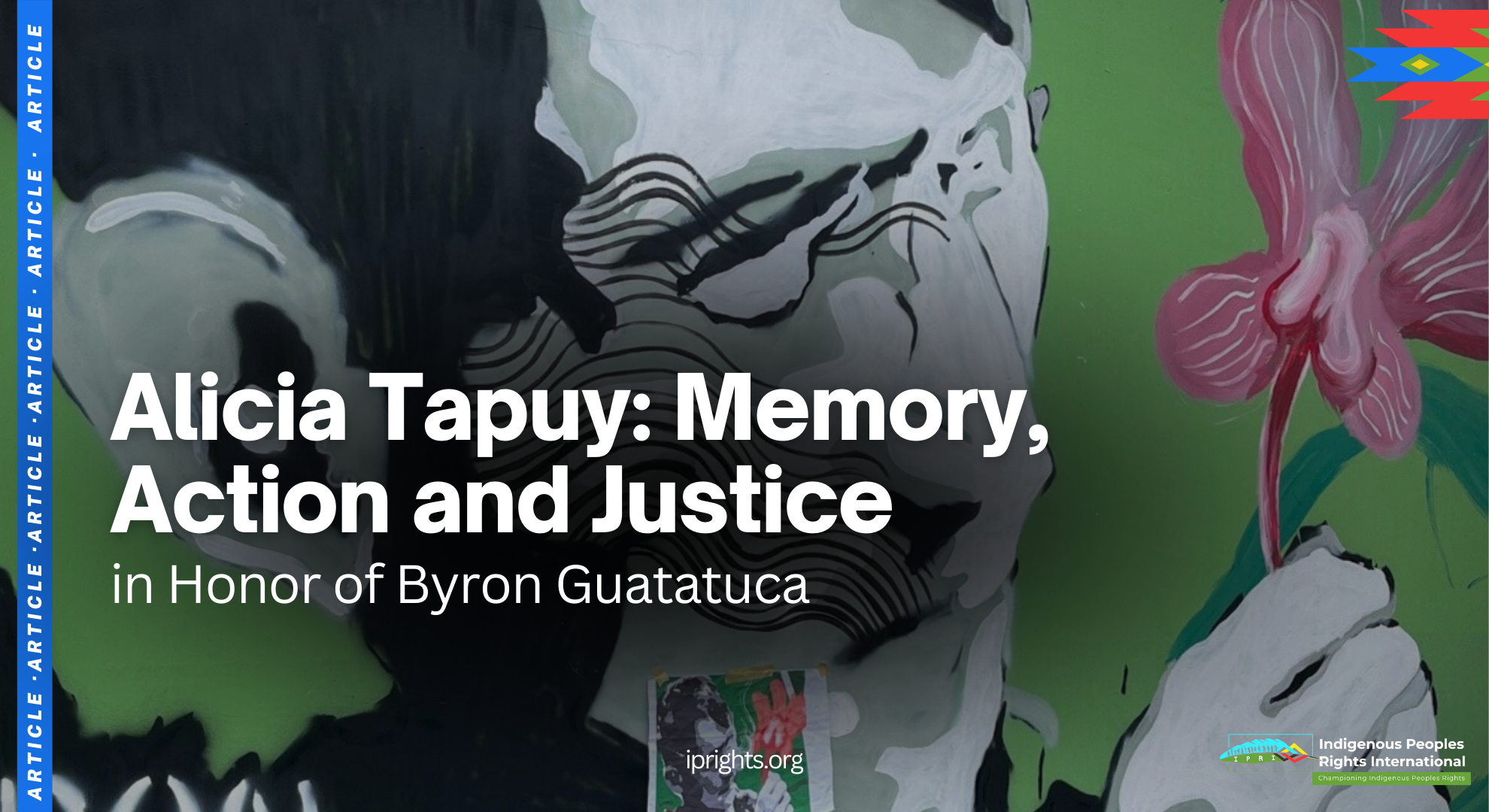
Alicia Tapuy: Memory, Action and Justice in Honor of Byron Guatatuca
On June 21, 2023, the death of Byron Guatatuca was commemorated in Puyo. It’d been a year since he was killed in a protest. His wife, Alicia, painted a heart in the place where he was assassinated and participated in the presentation of a mural in his honor.
Alicia is determined to bring justice to the death of Byron. She has even reached international instances. In November 2023, she spoke at a hearing at the Inter-American Commission on Human Rights, where she stressed the importance of seeking justice and reparations for the victims and their families.
Byron Holger Guatatuca Vargas was born on September 10, 1979, in the Comuna of San Jacinto del Pindo, city of Puyo, Pastaza province. Byron initially resided in Coca, but finally established residence in the Nueva Vida community, where he met Alicia Tapuy, his wife. Together they had four children.
Byron Gutatuca, along with thousands of people from Ecuador's indigenous nationalities and as a community leader, joined the call made by the Confederation of Indigenous Nationalities of Ecuador (CONAIE) for a national mobilization on June 13, 2022, in response to the neoliberal measures of then President Guillermo Lasso.
Among the demands of the movement were the reduction of fuel prices, renegotiation of debts and reduction of interest rates in the financial system, fair prices for rural products, employment and labor rights, payment of debts to the Ecuadorian Social Security Institute (IESS), moratorium on the expansion of the extractivist frontier, repeal of Decrees 95 and 151 that facilitate aggressive extractivism on indigenous peoples' lands, respect for collective rights, opposition to the privatization of strategic sectors, policies to control prices and speculation in basic necessities, guarantee access to health and education, and generate public policies on security.
After seven days of mobilization, on June 21, 2022, his life changed drastically. That day, the police began an eviction of protesters. Byron decided to join the national mobilization in the Picolino sector of Puyo. Tragically, Byron was the victim of a tear gas bomb in his face, allegedly thrown by the National Police. The impact caused severe damage to his brain, resulting in his death at 20:50 on June 21, 2022.
After Byron Guatatuca's death, his children faced a series of challenges. Three of the four had to drop out of school to help support the family. Two had to migrate to Cuenca for work. The fourth son, Elvis, 15, is studying with the support of his mother and siblings.
"Life has changed a lot for me, because he was the one who did everything in the house, paid the debts, and my children miss him more, and so do I," says Alicia. For her, the loss of her husband had a great impact on her life because he was the main breadwinner. His death has also had a significant impact on her children's lives as, in addition to the grief, they have had to take on additional responsibilities at a young age to help their mother meet the family's basic needs. Alicia had to start working, but her income is barely enough to cover food and fares for her youngest son.
Despite the hardships, the family has shown incredible strength and resilience. They continue to fight for justice for Byron's death and work hard to stay afloat in the midst of adversity.
Alicia has been at the forefront of the demands for justice for the death of her husband and has actively participated in the demonstrations and commemorations. "To the authorities tell them to keep the process moving forward, we are not going to leave it like this, we are going to continue every year bothering and knocking on the doors of the prosecutor's office, putting pressure on every year, to see how the process continues." she tells.
During the process, Byron Guatatuca's family has received support and advice from various organizations, which has given relief to the family and affirmed their determination that there should be no impunity for the murder. Indigenous Peoples Rights International (IPRI), a global organization that works to protect indigenous rights and fight against criminalization and impunity, provided support from its legal fund to cover legal and defense costs. The Fundación Regional de Asesoría en Derechos Humanos (INREDH) has been actively involved in their legal defense and research in the territory. CONAIE, Pakkiru and CONFENIAE have provided constant support in the defense and visibility of this and other similar cases. And for its part, its grassroots community, the San Jacinto del Pindo Commune, has been actively involved in keeping her memory alive and demanding justice for her death.
Alicia remembers her husband as a very loving person; that's why everyone knew him. "At work they loved him. He was working on contracts, so he was known everywhere. The people who didn't know he was dead keep calling him to go to work," she says.
Byron was a very respected man in his community. He was a leader of the Chinimbe Viejo community, which he founded with his twelve brothers. After his death, the community has undergone changes. Many of the inhabitants have stopped visiting - it is now just bush - because without Byron's presence they say it is not the same. The community, once a place of gathering and cooperation, is now falling into oblivion.
Her story is a testimony of resistance and struggle for justice. Despite tragedy and hardship, Alicia continues on, carrying Byron's memory and seeking reparations and justice for his death. Her story is a reminder of the impact of state violence against indigenous peoples and the importance of the struggle for justice and accountability.


%2020.49.20.png)
